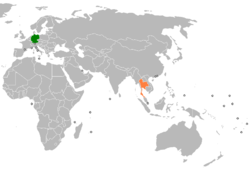
Phra Bat Somdet Phra Nangklao Chaoyuhua, personal name Thap, also styled Rama III, was the third king of Siam from the Chakri dynasty, ruling from 21 July 1824 to 2 April 1851.

Pinklao was the viceroy of Siam. He was the younger brother of Mongkut, King Rama IV, who crowned him as a monarch with equal honor to himself.

Bilateral relations between the Kingdom of Thailand and the United States of America date back to 1818. Thailand and the United States have long been close allies and diplomatic partners.

Kosa Pan was a Siamese diplomat and minister who led the second Siamese embassy to France sent by King Narai in 1686. He was preceded to France by the first Siamese embassy to France, which had been composed of two Siamese ambassadors and Father Bénigne Vachet, who had left Siam for France on January 5, 1684.

The 1955 Austrian State Treaty ended the four-power occupation and recognized Austria as an independent and sovereign state. In October 1955, the Federal Assembly passed a constitutional law in which "Austria declares of her own free will her perpetual neutrality." The second section of this law stated that "in all future times Austria will not join any military alliances and will not permit the establishment of any foreign military bases on her territory." Since then, Austria has shaped its foreign policy on the basis of neutrality.
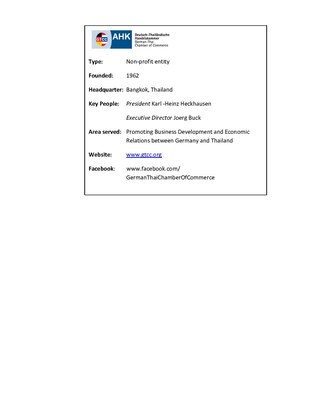
AHK Thailand or the German-Thai Chamber of Commerce (GTCC) is a non-profit entity which promotes bilateral economic relations between Germany and Thailand. It is a member of the German Chambers of Commerce Worldwide Network (AHKs), with 150 locations in 93 countries around the world.
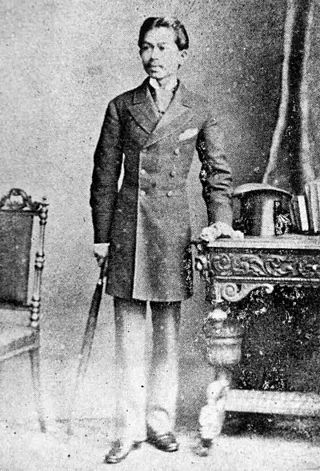
Prince PrisdangHis Highness Prince Prisdang birth name is His Serene Prince Prisdang. he was a member of the family of the Chakri dynasty of Siam and a Thai diplomat.
The Taipei Representative Office in the Federal Republic of Germany; represents the interests of Taiwan in Germany in the absence of formal diplomatic relations, functioning as a de facto embassy.
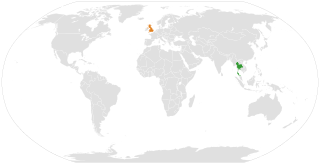
Bilateral relations between Thailand and the United Kingdom date to the 17th century. Thailand has an embassy in London and the UK has an embassy in Bangkok.

The Embassy of France in Bangkok is the chief diplomatic mission of France in Thailand, and one of the oldest in the country. It was established as a consulate in its current location on the Chao Phraya River off Charoen Krung Road in Bangkok's Bang Rak District in 1857, following the signing of the Treaty of Friendship and Commerce which re-established diplomatic relations between the two countries the previous year. The mission was elevated to a legation in 1892 and an embassy in 1949, and supports the ambassador in promoting political, economic and cultural ties between the two countries.

Germany–Morocco relations date back to the 19th century. The German Foreign Office describes Morocco as a "central partner of the European Union and Germany in North Africa," and Germany is an important trading partner for Morocco. In the past, however, relations have not always been entirely free of tension.

Germany–Niger relations focus primarily on cooperation in development, security, and migration policy. Since 2016, bilateral relations have been significantly intensified, with several state visits at the highest level.

Germany–Somalia relations have intensified since 2012 after the political and security situation in Somalia improved, according to information from the German Foreign Office. Germany has not had an ambassador to Somalia since 1989, and the German Ambassador in Nairobi is responsible for relations with Somalia instead.

German-Uganda relations have existed since 1962 and are described by the German Foreign Office as "positive". Uganda is one of the priority countries of German development aid and more than 100 associations and initiatives from Germany support humanitarian projects in Uganda.
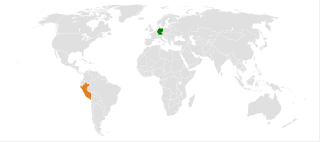
Germany–Peru relations are the bilateral relations between Germany and Peru. The relations are described by the German Foreign Office as "close and friendly". Cooperation between Germany and Peru takes place at both the bilateral and multilateral level.

Germany–Venezuela relations have a long tradition and were officially established in 1871. During Nicolás Maduro's tenure, relations have deteriorated and in 2019 Venezuela declared the German Ambassador Daniel Kriener a persona non grata; however, he was able to return to the country soon after. Close relations with Venezuela continue to be maintained by parts of the German left and the political party Die Linke.

On the diplomatic level, Colombia–Germany relations have existed since 1872 and thus for more than 140 years.
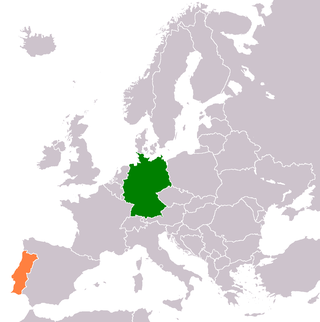
Germany–Portugal relations are the diplomatic relations between Germany and Portugal. Both countries are members of the Council of Europe, the Organisation for Security and Cooperation in Europe, the OECD, NATO, the European Space Agency, the European Union, the Eurozone and the Schengen area, among others.

Germany–Jordan relations are described by the Federal Foreign Office as having been "close and friendly for a long time". Germany is one of Jordan's most important partner countries, with intensive political and economic relations.

Germany–Madagascar relations are "traditionally friendly", according to the German Foreign Office. Diplomatic contacts have been maintained between the two countries since the 19th century. In the 21st century, relations between the two countries are predominantly characterized by development cooperation.
